Sloppy, but decent.
 Posted : 17 years, 2 months ago on 23 April 2008 03:07
(A review of Battle of the Bulge)
Posted : 17 years, 2 months ago on 23 April 2008 03:07
(A review of Battle of the Bulge)I will never understand why this war film was so heavily pasted by critics and audiences. Battle of the Bulge is a true classic, and stands among some of the finest war movies ever made. Granted it's no-where near perfect, but well made and with good production values.
The film chronicles the battle that took place in December 1944 between the Germans and the Americans. One of the main focuses of the story is the Germans recruiting English-speaking German soldiers to disguise themselves as Americans and parachute behind enemy lines to sabotage the defence.
Like most classic war films, the film also shifts its focus to a host of different characters on both sides of the offensive. I found the production most impressive, as all the uniforms look great, each tank looks accurate and every detail is crafted brilliantly.
There are very good performances all round, including Robert Shaw as a strict German officer, and Henry Fonda as an American who predicts the assault. The battles look most impressive, especially the epic scale (like the number of extras, and the realistic props) but when compared to today's war movies it seems pretty tame in terms of gore.
It all seems very antique, but still stands as a fine movie even by today's standards. The director of The Longest Day, Ken Annakin, does a damn fine job of bringing the film to life. However it wasn't without flaws.
First off, the script felt rather banal at times. I am amazed that all the Germans speak fluent English when planning their attacks and while present in a war room.
Also, the film runs far too long. The dialogue is interesting, but it's not much of a history lesson.
Nonetheless, Battle of the Bulge is a good war film. It's enjoyable and entertaining, but very dated at the same time.
 0 comments, Reply to this entry
0 comments, Reply to this entry
Decent entertainment.
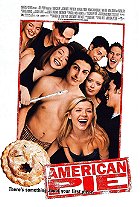 Posted : 17 years, 2 months ago on 23 April 2008 03:03
(A review of American Pie)
Posted : 17 years, 2 months ago on 23 April 2008 03:03
(A review of American Pie)I doubt anyone would watch a comedy like this with hopes of it being a masterpiece. In all fairness, American Pie is not even close to being a masterpiece but at least it's a good slice of fluffy entertainment.
This American teen sex comedy is about a group of four teenagers; Jim (Biggs), Chris (Klein), Kevin (Nicholas) and Paul (Thomas). Like most American teenagers, all four are obsessed with sex. But they're in their final year of high school and they all remain virgins much to their dismay.
Despite trying desperately hard to lose their virginity, all four are unable to score with a girl. But the four guys soon develop a pact; that they will all lose their virginity by the night of their senior prom. But as fate would have it, the boys encounter overwhelming obstacles during their attempts at "becoming a man".
The film falls squarely into the coming-of-age genre. It is able to grasp the attention of its target audience because the portrayal of high school life is something that common teens can relate to.
Who knows, perhaps the film will invoke nostalgic memories in the minds of adults about their teenage years and the raging hormones of their youth.
I think the film succeeds in accurately portraying high school life, but the filmmakers are more concerned with raunchy gags rather that witty humour. I've never been an overall fan of sexual humour, so the film wasn't entirely to my taste. The use of humour that includes cracks about masturbation and other things in that vein get very tedious due to how frequent they are. I very rarely, if ever, found myself laughing.
The whole film is very stupid and embarrassing at times. There are some particularly explicit scenes (one including an apple pie...fans of the movie would know what I'm referring to), and a whole heap of foul language mixed in there as well.
The bottom line about American Pie is that it's a bit of simple light-hearted entertainment. It contains a disappointingly low number of laughs but contains a plot most of us can relate to. It's incredibly stupid and it's highly coarse at times as well. If you're a fan of these disappointing sex comedies then you'll probably enjoy it. If you want a bit of entertainment, you'll like it. But it's nothing more than an average film. Look out for a very sneaky reference to The Graduate.
 0 comments, Reply to this entry
0 comments, Reply to this entry
Powerful anti-war production...
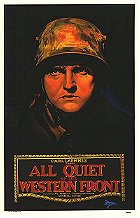 Posted : 17 years, 2 months ago on 23 April 2008 02:42
(A review of All Quiet on the Western Front)
Posted : 17 years, 2 months ago on 23 April 2008 02:42
(A review of All Quiet on the Western Front)Brilliant, relentless and heart-wrenching anti-war drama is still as powerful now as it was when released almost 80 year ago.
All Quiet on the Western Front is a classic war movie that is tragically overlooked due to its age, which is a real shame. The film is set during World War I from the perspective of a number of German teenagers brainwashed into thinking that fighting and dying for the Fatherland is glorious and a high honour.
Upon reaching the battle-grounds, no-one is ready for what they are exposed to. The whole film mainly follows young German Paul Baumer (Ayres) who lives to see many of his friends meet their untimely demise.
Told in grainy black and white, the movie feels like old documentary footage rather than a staged movie. It's this effect, coupled with the great performances that make this movie so memorable and classic.
The powerful anti-war themes underline the true malicious nature of humanity. The film was originally very controversial and was banned in many countries due to the relentless war themes, including some truly spectacular battles. For a 1930s movie, the battles look absolutely fantastic. Sure, modern audiences may be disappointed with the gore aspect but there are plenty of brutal scenes of stabbings, people getting mowed down with machine guns, limbs being blown off and the use of explosives.
All Quiet on the Western Front is a montage of memorable scenes that are remembered in film history. For those familiar with the movie, each scene is unforgettable and lead up to the final shot of a man reaching for a fatal butterfly.
Overall, All Quiet on the Western Front is a classic war movie that still delivers a powerful message decades after it was made. The anti-war themes are a prominent feature, and the final shot really hits home. Highly recommended!
 0 comments, Reply to this entry
0 comments, Reply to this entry
Arnie's worst hour...
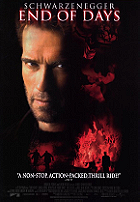 Posted : 17 years, 2 months ago on 23 April 2008 02:39
(A review of End of Days)
Posted : 17 years, 2 months ago on 23 April 2008 02:39
(A review of End of Days)
End of Days is a film that can be summed up with one simple statement: Schwarzenegger vs. Satan. For the fans of Schwarzenegger, I'm sure you'll delight in Arnie battling supernatural forces.
Unfortunately despite liking a number of Arnie's action movies, End of Days could be his worst action movie thus far. The film is ridiculous, stupid, overproduced, dumb, horrible and just plainly abysmal!
Basically, a girl named Christine (Tunney) is born in 1979 and is apparently "chosen by Satan" to be his bride. The Vatican is aware of her presence and aim to protect her. In the latter of 1999, just before the new Millennium, Christine is living with her stepmother and is being plagued with visions of Satan. Then Satan comes to Earth, takes the form of a human, and aims to find his bride that he chose 20 years ago.
Jericho Cane (Schwarzenegger) is still getting over the devastation of losing his family. He begins investigating strange occurrences to do with priests and other weird religious nut-cases. As it turns out, the Vatican have a sudden change of heart and now want to kill Christine before the beginning of the new Millennium as she can bring about the "end of days".
From there the film is a heap of religious mumbo jumbo filled with stupendous action that becomes embarrassingly not entertaining due to the poor nature in which it was created. I don't know where to start with my elaboration of that sentence...but basically the fast cuts look appalling. It suffers from the same syndrome as many modern action movies. Making fast cuts and using shaky cam in an attempt to please the "four-minute music video generation" of action movie-goers. As a result the action doesn't make a lick of sense and you can't make out anything.
Not to mention it was poorly edited, with continuity errors surfacing frequently. And the director made a "creative decision" to make the film clouded in darkness. As a result of this dismal concept, nothing can be made out. Everything is so dark and lacking in shadow detail that the action looks even worse.
And because there's so much action and little exposition, the whole movie is essentially religious gibberish with a few guns being fired and a lot of blood. The scenes of action get so monotonous towards the end that it isn't even worth your time.
And yet, it keeps getting even more stupendous towards the pathetic conclusion of the movie.
Usually I'd respect Arnie due to his skills during action scenes, but his performance is mind-numbingly bad! Maybe it would have worked as a drama with a good actor in the title role. But an action movie that's meant to be taken seriously that promotes Schwarzenegger as the film's primary acting talent? Give me a break!
There's also such a dreadful script and awful direction thrown in here as well. On top of this, the special effects weren't impressive at all.
The film also makes absolutely no sense. Schwarzenegger investigates murders and yet keeps saying he's not a cop, but a private citizen? The Vatican saying they will protect the girl...but all of a sudden get men to try and kill her? Satan magically grabs loads of henchman to fight against Schwarzenegger?! There's so much more I could describe here, but you don't need to get very far to know that this is certainly one to leave on the shelf.
Honestly, I think everything in this movie was bad. It would take pages to list all its flaws! The result is truly, painfully appalling and a no-brainer action movie. I don't think there were any redeeming features at all. Don't rent it, don't watch it, and don't even consider buying it! Lowest point: Arnie getting the crap beaten out of him by a granny.
 0 comments, Reply to this entry
0 comments, Reply to this entry
Entertaining sci-fi romp.
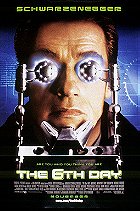 Posted : 17 years, 2 months ago on 23 April 2008 02:35
(A review of The 6th Day)
Posted : 17 years, 2 months ago on 23 April 2008 02:35
(A review of The 6th Day)
The 6th Day marks Schwarzenegger's return to sci-fi action with this typically entertaining saga about the topical issue of human cloning.
Set in the not-too-distant future, scientists have discovered a way to clone typical animals (including house-holds pets). But human cloning is outlawed when an experiment goes horribly wrong, with devastating results.
Despite this government restriction on the cloning of humans, a group of scientists work to perfect the technique. Enter typical house-hold husband Adam Gibson (Schwarzenegger) who becomes entangled in a conspiracy when he comes home to discover that he has been cloned and his life has been stolen from him. But the cloning scientists cloned him by mistake (of course it's a mistake to throw two Arnies into the mix), and once they discover their mistake they seek to eliminate Adam to avoid government action against them.
And thus begins a race against all odds as Adam battles to get his life back.
A very original idea, and made during the time when mankind had been most curious about cloning. The film was certainly made at the right time and has relevance to contemporary society...but face it, when you throw Schwarzenegger into a sci-fi action film you're not going to expect a masterpiece. The man cannot act overly well, but at least he's impressive during the action scenes.
And even though the film delivers a good message about its topic, it's still full of plot holes and incredible stupidity on the part of the villains. But of course it's merely an action film, not anything groundbreaking.
The performances were very mixed. Everyone knows that Schwarzenegger can't deliver his lines without making them sound contrived. This is no exception. There's a bit of intensity in his performance, but he's far from receiving an Oscar. Tony Goldwyn was a very intriguing villain. He does what he can with such a mediocre screenplay, but he's not enough to make up for Arnie's average performance here.
Most of the supporting cast are pretty good, but some of the more talented actors are given a side-line position. A shame, because with a bit less Arnie and a bit more talent this film could have made itself a little better.
The visual effects blew me away. For a film made in the age when CGI was still in its infancy, it sells the concept of the future exceptionally well. Especially with the high-tech weaponry and the high-tech computers.
The screenplay was standard. It was at least unpredictable, but we all knew how it was going to end. But despite this, it's an incredibly fun film to watch.
The 6th Day is a fairly impressive sci-fi/action film. There's some good action, some creative ideas and a clever concept of the future. Worth seeing.
 0 comments, Reply to this entry
0 comments, Reply to this entry
Sci-fi classic!
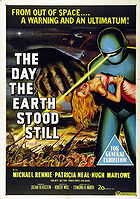 Posted : 17 years, 2 months ago on 23 April 2008 02:29
(A review of The Day the Earth Stood Still)
Posted : 17 years, 2 months ago on 23 April 2008 02:29
(A review of The Day the Earth Stood Still)
The Day the Earth Stood Still is a brilliant, influential landmark science fiction production that stands the test of time. Many will see the film as dated and unnecessary, but truth be told the film has lost essentially none of its original impact. It delivers an exceptional message (that couldn't have come at a better time, I might add) and ends without outstaying its welcome.
This classic story marks one of the first alien invasion films, and it set the bar for things to come.
On one seemingly normal day in Washington, the army detects and unidentified aircraft moving at incredible speed. The alien spacecraft lands in the middle of Washington, and a humanoid alien named Klaatu (Rennie) heads out into civilisation. His mission is to warn the human race about their use of atomic weapons and its threat towards life-forms from other planets.
Klaatu places himself in the typical city to orient himself with the surrounding species, and try to talk some sense into humans. If humans do not cease atomic activities, the Earth faces obliteration as they threaten peace within the solar system.
The Day the Earth Stood Still is not only one of the greatest and most innovative science fiction films in existence, but one of the best films released by Hollywood during the 1950s. The imagination of the filmmakers is incredible. Made during the period when mankind actually was experimenting with such weapons, the film delivers a strong and powerful message about its stance on the whole situation.
Although it would be impossible for aliens to threaten us as strongly as they do in the movie, it gives the audience a true perspective of the capabilities of atomic weapons.
The direction by Robert Wise is exemplary. His direction allows the movie to move at a perfect pace over the reasonably short running time of 88 minutes. There was never a dull moment for me.
The whole cast did a commendable effort in bringing their characters to life. Michael Rennie especially delivered a downright ideal performance as the humanoid alien. As the central character, he breathes live into every line delivered and has a charming screen presence.
The special effects look amazing for its time. They are still hard to fault even by today's standards. And of course the eerie, atmospheric score by Bernard Herrman suited the tone of the film superbly.
The Day the Earth Stood Still is decades ahead of its time, and is far superior to the typical invasion flicks of the 1950s. A must for science fiction buffs. Highly recommended.
 0 comments, Reply to this entry
0 comments, Reply to this entry
Woeful chick flick!
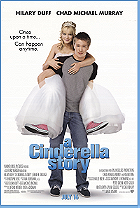 Posted : 17 years, 2 months ago on 23 April 2008 01:15
(A review of A Cinderella Story)
Posted : 17 years, 2 months ago on 23 April 2008 01:15
(A review of A Cinderella Story)A chick flick with Hilary Duff? Did anyone expect this to end up being a good movie? A Cinderella Story is merely the classic tale of Cinderella that has been updated for the modern audience. Great, they do it with Shakespeare and now they're updating fairy-tales for the modern agenda? I really don't see the need.
A Cinderella Story is about a young girl named Sam Montgomery (Duff) who was orphaned as a child and is left to the mercy of her routinely oafish step-mother Fiona (Coolidge). Sam also lives with her hideous step sisters, and is basically treated like a slave by everyone in the house.
But Sam meets the man of her dreams in a chat room. For months they have exchanged pleasant messages from each other via internet chat rooms of mobile phone text messages. (Does anyone else think that if they had each other's mobile phone number they could just ring and chat voice-to-voice, and hence be done with the mystery?) The two then decide they should meet at the school Halloween dance. As it turns out, Sam's dream guy is the most popular bloke in school; Austin Ames (Murray).
From there on in it's a trip into familiar territory; no matter what happens we know how it is going to end. It's obvious how the film will end just by watching the first 10 minutes. But I found myself exhibiting an incredibly bleak, shallow tale that keeps going on and on with no ending in sight. But what is most frustrating is when Sam has ample opportunity to tell Austin face-to-face that she is his internet girl but always blows her chance. And at the Halloween ball...one simple little mask wouldn't be enough to cover her identity.
The whole movie is cheesy and predictable. And unlike most comedies like this, it ain't a fun ride to take. Hilary Duff is in dire need of acting lessons. With her character hoping to get into a certain university for the movie, I had a faint glimmer of hope that it would be some kind of acting school.
Chad Michael Murray isn't any better. He's robotic, wooden and always has the same expression on his face. And every time he tries to do something different he overdoes it. Jennifer Coolidge was the only one who actually supplied a few laughs because of how evil she is. Regina Hall and Dan Byrd were the stand-outs here though. Regina was really funny at times, and Dan actually tried to act. Qualities we never see in any of the main cast.
A Cinderella Story is very dull, corny and painfully predictable beyond all belief. It's nothing more than a retelling of the classic fairy-tale in a contemporary setting. Doing this with Shakespeare is a good idea to help the modern audience understand it more clearly, but this fairy-tale was already understandable. And hence the whole film is a complete and utter waste of time.
 0 comments, Reply to this entry
0 comments, Reply to this entry
Mediocre chick flick.
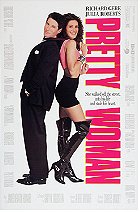 Posted : 17 years, 2 months ago on 23 April 2008 01:12
(A review of Pretty Woman)
Posted : 17 years, 2 months ago on 23 April 2008 01:12
(A review of Pretty Woman)
Pretty Woman is one of those chick flicks that were bunched together with films I usually have no interest in seeing. Upon finally viewing it I realised that my expectations were mildly surpassed, although not severely.
I will admit having a fun time watching the movie as it had a few clever laughs and some fascinating characters.
Richard Gere is Edward Lewis; a wealthy, eccentric businessman who specialises in corporate raiding. One evening Edward is on a business trip and finds himself lost in Hollywood. Enter curious prostitute Vivian (Roberts) who agrees to give Edward directions to his destination.
Because Edward is lonely and is the king of impossible relationships, he decides that for the duration of this trip he does not want to be alone in his hotel room all the time. Thus he offers Vivian a considerable amount of money for her to spend the week with him. Vivian was once a filthy hooker who walked the streets, but as the week goes by Edward plans to make a real woman out of her.
This transformation from whore to lady is very amusing at times and takes an enticing look at the prejudice in our society towards hookers. Of course as predicted, this week together sparks romance between the two protagonists.
Pretty Woman is a romantic comedy that developed its roots from the classic story of Cinderella. Although not blatantly obvious at first, the film also contains recurring themes of fairy-tales and princes that further solidify this idea of an updated Cinderella tale.
Richard Gere is an actor I've never admired. Not to say that he's a bad actor, but his choice of roles appears to boil down to chick flicks and romantic comedies - i.e. films that I generally avoid. Gere brings a sense of charisma and charm to his character. Playing a handsome millionaire, this was a vital character trait to make the film work. Gere gave it everything he could.
Julia Roberts was the perfect partner for Gere. She nails the love-stricken, optimistic prostitute. Needless to say, the actors needed a decent script as well to ensure the success of the movie. I thought the screenplay was well written. It has some funny dialogue and develops a very unique set of characters. Unfortunately, the lack of laughs was a major downfall. Especially because the film was so predictable I would have expected the laughs to be in greater numbers. With these limited laughs, there is no overshadowing the clichéd and predictable nature of the film.
The directing was standard for the genre; nothing too great, nothing too shabby. One of the more positive stand-outs I discovered while watching the movie was its soundtrack. There's loads of classic music present here. You don't need to be a detective to figure out what the title song must be.
Overall, Pretty Woman was better than I anticipated. Films like these are simple entertainment to be shared with a few friends. Because of the adult themes and profanity this can't be considered a film for the family.
Pretty Woman is a film worth seeing because it's different and creative; boasting a number of great characters that are executed well. The film is light-hearted entertainment and should never be considered Oscar material. Worth a rental, at least.
 0 comments, Reply to this entry
0 comments, Reply to this entry
Good, but vastly overrated.
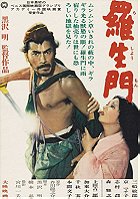 Posted : 17 years, 2 months ago on 23 April 2008 12:53
(A review of Rashomon)
Posted : 17 years, 2 months ago on 23 April 2008 12:53
(A review of Rashomon)Akira Kurosawa's Rashomon is a film that I both liked and disliked.
On the one hand it was a visual arresting, superb study of human nature. But on the other hand the film is highly boring not to mention monotonous.
Rashomon opens as a group of men start discussing a heinous crime that unfolded on an isolated bush trail, and then the film looks in-depth at four different perspectives of what happened.
For me this was a fascinating plot synopsis and I wanted to see it because it sounded quite intriguing. The audience is presented with a set of differing eye-witness accounts and are given the opportunity to draw their own conclusions.
The first thing that stood out is the cinematography and the locations. The camera is used to great effect and with great visual flair. The game actors give it everything they have and the dialogue is occasionally quite effective. At first I thought that there's no way that this could go wrong. Unfortunately, my interest in the film flew out the window within the first five minutes. Everything just became so tedious and boring, with eye-witness accounts that are poorly distinguished. I was struggling to not only figure out who is giving their testimony, but also what the hell is so different about each story. There were a few things, but nothing overly obvious. I was paying full attention to it, but you have to be some kind of mind-reader to actually comprehend what on Earth is going on!
Another thing that struck me was the melodramatic fashion in which the film was played out in. The leading female spent the whole time crying, screaming or laughing in a creepy manner. Whenever she's crying or screaming I was covering my ears as it was giving me a headache. She was indescribably irritating!
The male members of the cast weren't much better. There was one crazy maniac who spent the whole time laughing. I usually appreciate this form of acting as it displays what they're capable of, but he was so damn annoying and it was far past being a brilliant way to display the character.
But on the other hand Rashomon is a visual feast for the eyes, with impressive stylised action and some effective grainy black & white photography. The bush trail in particular gave the impression of isolation in times of danger. The film's underlying messages are truly worthwhile about the reliability of the word of a man. Lies, deceit and callousness abound. Rashomon is a much loved classic from director Akira Kurosawa. I'm not fan of the director, and therefore watched the film with an open mind, but I met the film with mixed feelings. The concept is tremendously original and groundbreaking. I just wished the execution had improvements.
 0 comments, Reply to this entry
0 comments, Reply to this entry
Almost worth the wait
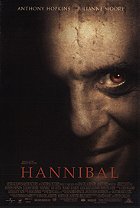 Posted : 17 years, 2 months ago on 23 April 2008 12:46
(A review of Hannibal)
Posted : 17 years, 2 months ago on 23 April 2008 12:46
(A review of Hannibal)The character of Dr. Hannibal Lector is one of the most brooding, foreboding screen villains in history. Michael Mann translated Lector from written literature to film with Manhunter. That film had Brian Cox portraying the title role.
But when Silence of the Lambs hit cinemas, Sir Anthony Hopkins made the role his own. Hopkins was unforgettable, and Silence of the Lambs was acclaimed by both critics and audiences.
About 10 years after its release this sequel was announced. Because of the quality of its predecessor, Hannibal had some seriously large boots to fill.
Hannibal finds the character of Dr. Hannibal Lector (Hopkins) still at large after reaching freedom ten years ago. Now Lector is living the good life in Italy as a museum curator under the guise of Dr. Fell. Special agent Clarice Starling (this time played by Moore as opposed to Jodie Foster) has reached a pitfall in her career after an unsuccessful FBI raid that seriously questions her judgement; what befalls is Clarice being relieved of active duty.
Over in Italy Lector's cover is blown when a sneaky inspector (Giannini) begins poking around; believing that he has found one of the FBI's ten most wanted fugitives. As Lector has now been exposed he initiates a game of cat-and-mouse between himself and Clarice when he heads back to American shores. On top of this a horribly disfigured millionaire (an unrecognizable Gary Oldman) wishes to exact revenge on Lector for what he did to his face several years earlier.
So was it worth the wait for Hannibal, this belated sequel? The answer to that question is seriously up for debate. The major downfall of this film was the little interaction between Clarice and Lector. Silence of the Lambs was brilliant for its frequent sequences that featured communication between the two central characters.
The taut direction of Jonathon Demme was replaced by the artistic, focused direction of Ridley Scott. This is not necessarily a bad thing. Ridley Scott is a highly talented director who will always be skilled behind the camera. Every shot during the film was eye-catching because Scott is always so focused on reaching perfection. The dialogue scenes in particular were filled with energy and engaging performances.
Jodie Foster chose not to reprise the role that won her an Oscar. She is replaced by Julianne Moore: a capable actor whose performance is top notch. Moore does justice to the character; falling just short of reaching the standard of Jodie Foster.
Anthony Hopkins will always be the essential embodiment of Hannibal Lector. Hopkins is unbeatable when you discuss this role. He is menacing and ominous; always remaining cool whenever something happens. The beauty of the character is that no matter how bad the situation is he will never alter his facial expression; instead always remaining brooding and nonchalant.
The production values are utterly sublime; the make-up in particular was outstanding. I could not recognise Gary Oldman underneath the astounding make-up he was caked in.
Hannibal contains some pretty graphic imagery; sometimes displaying a sickening degree of violence and gore. Where would a Hannibal movie be without the gore?
Hannibal was a much anticipated sequel that was marginally a disappointment. The film is very entertaining but builds to a highly unsatisfying anti-climax that is both confusing and betraying. On the whole, the film feels very incomplete albeit entertaining and stylish. A strong sequel to Silence of the Lambs. The film isn't fantastic, although it isn't terrible either.
 0 comments, Reply to this entry
0 comments, Reply to this entry
 Login
Login
 Home
Home 183 Lists
183 Lists 1674 Reviews
1674 Reviews Collections
Collections